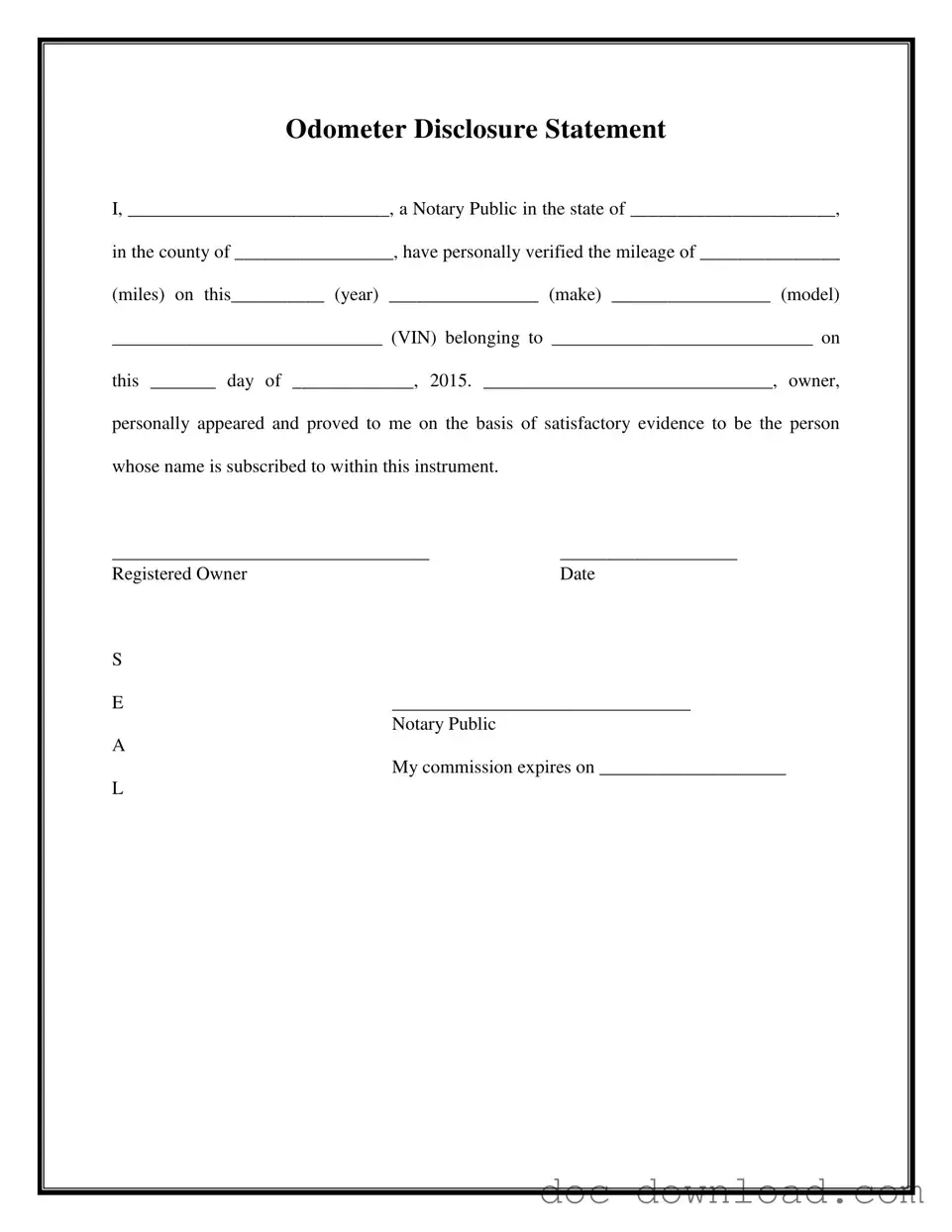Fill Out Your Notarized Odometer Statement Template
The Notarized Odometer Statement form serves as a crucial document in the process of transferring vehicle ownership. It is designed to provide an official record of a vehicle's mileage at the time of sale, helping to prevent fraud and ensuring transparency in transactions. This form is typically completed by a notary public, who verifies the accuracy of the mileage and the identity of the vehicle owner. Essential details included in the form are the vehicle's make, model, year, and Vehicle Identification Number (VIN), along with the recorded mileage. The form also captures the date of the transaction and the notary's commission expiration, further enhancing its legal validity. By requiring the notarization of this statement, both buyers and sellers can have greater confidence in the authenticity of the odometer reading, which is vital for making informed decisions about vehicle purchases. Ultimately, this form plays a significant role in maintaining the integrity of the automotive marketplace.
Similar forms
The Bill of Sale is a crucial document often used in the sale of vehicles. It serves as a receipt for the transaction, detailing the buyer and seller's information, the vehicle's description, and the sale price. Similar to the Notarized Odometer Statement, it requires signatures from both parties to confirm the agreement. This document provides proof of ownership transfer and can be essential for both the buyer and seller in case of disputes or future transactions.
The Vehicle Title is another important document that is closely related to the Notarized Odometer Statement. The title serves as legal proof of ownership for a vehicle. When a vehicle is sold, the title must be transferred from the seller to the buyer, often requiring the seller to disclose the odometer reading at the time of sale. This ensures transparency and helps prevent fraud regarding the vehicle's mileage.
The Vehicle History Report provides a comprehensive overview of a vehicle's past. It includes information about previous ownership, accident history, and odometer readings. Like the Notarized Odometer Statement, this report aims to protect buyers by offering insights into the vehicle's condition and history. It helps potential buyers make informed decisions and can reveal discrepancies in odometer readings.
The Affidavit of Odometer Disclosure is similar in purpose to the Notarized Odometer Statement but may not always require notarization. This document is a sworn statement by the seller regarding the vehicle's mileage at the time of sale. It serves to protect both parties from potential fraud. By providing an affidavit, sellers affirm the accuracy of the odometer reading, which can be crucial if disputes arise later.
For those involved in property transactions, understanding various legal documents is crucial, including the necessity of a Quitclaim Deed. A quitclaimdeedtemplate.com/colorado-quitclaim-deed-template can assist in navigating the complexities of transferring real estate ownership with clarity and precision, ensuring that parties are aware of their rights and responsibilities in the transfer process.
The Application for Title and Registration is another document that parallels the Notarized Odometer Statement in that it often requires odometer disclosure. When a vehicle is registered with the Department of Motor Vehicles (DMV), the application typically includes a section for the seller to report the current odometer reading. This ensures that the state has accurate information about the vehicle's mileage, helping to maintain integrity in vehicle records.
Lastly, the Power of Attorney for Vehicle Transactions can also relate to the Notarized Odometer Statement. This document allows one person to act on behalf of another in vehicle-related matters, including the transfer of ownership. When a vehicle is sold, the person holding the power of attorney may need to provide an odometer statement. This ensures that all necessary disclosures are made, protecting both the seller and the buyer in the transaction.
Form Specifications
| Fact Name | Description |
|---|---|
| Purpose | The Notarized Odometer Statement is used to confirm the mileage on a vehicle at the time of sale. |
| Notary Requirement | A Notary Public must verify the information and witness the signatures on the form. |
| State-Specific Forms | Each state may have its own version of the form, governed by state laws regarding vehicle sales. |
| VIN Inclusion | The Vehicle Identification Number (VIN) must be included to uniquely identify the vehicle. |
| Owner's Verification | The registered owner must appear in person to provide satisfactory evidence of identity. |
| Expiration Date | The Notary Public must indicate the expiration date of their commission on the form. |
Different PDF Templates
Fedex Freight Truck - There are sections to clarify any special handling instructions that may be required for the shipment.
When engaging in the sale or purchase of an all-terrain vehicle, it's essential to have a proper record of the transaction, which is where the California ATV Bill of Sale form comes into play. This document not only outlines the necessary details regarding the seller, buyer, and vehicle but also ensures that both parties are protected. To learn more about this important form and simplify your transaction process, visit californiapdffoms.com.
Ncoer - The DA 2166-9-1 form is utilized during annual evaluation cycles or when there is a need for a performance review.
Sample - Notarized Odometer Statement Form

ODOMETER DISCLOSURE STATEMENT
I, ____________________________, a Notary Public in the state of ______________________,
in the county of _________________, have personally verified the mileage of _______________
(miles) on this__________ (year) ________________ (make) _________________ (model)
_____________________________ (VIN) belonging to ____________________________ on
this _______ day of _____________, 2015. _______________________________, owner,
personally appeared and proved to me on the basis of satisfactory evidence to be the person whose name is subscribed to within this instrument.
__________________________________ |
___________________ |
Registered Owner |
Date |
S |
|
E |
________________________________ |
|
Notary Public |
A |
|
|
My commission expires on ____________________ |
L |
|
